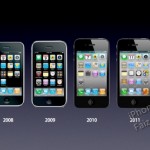
Rangkaian Artikel yang saya posting secara berseri ini saya kutip dari Buku The Apple Way : 12 Management Lessons from the World’s Most Innovative Company karya Jeffrey L. Cruikshank. Banyak Point dan pelajaran tentang management yang bisa kita ambil dari Perusahaan paling inovatif di Dunia ini. Mari kita belajar dari Keberhasilan dan Kegagalannya. Selamat Menikmati.
The same company, some of the same players, and some important, enduring philosophical threads—and yet, the outcomes of the Lisa and the iPod stories couldn’t be more different.
You could conclude that the two launches had nothing in common. You could conclude that because they were separated by almost two decades, in an industry characterized by nothing so much as rapid change, that there are no lessons to be teased out of them. But you would be wrong. Over the years, Apple learned from its mistakes and changed. As The New Yorker recently put it:
Even Apple Computer—once the most imperially self-reliant of companies—has changed. Steve Jobs used to fantasize about controlling everything down to the sand in Apple’s computer chips.
Today, Apple works contentedly with companies like Motorola and Hewlett-Packard.
You can’t do it by yourself, no matter how smart you are. Markets move too quickly, technologies grow too complex, and too many smart people are investing too much time and money in innovation. And, by the way, lots of those smart people are working in teams, trying to beat you out.
Well, for Apple, this was hard-won wisdom. (Jobs doesn’t give up on his fantasies easily.) That lesson—and many more like it—are captured in the following pages. And just as important, some things about Apple “didn’t” change.
Consider the following list:
■ Be intuitive.
■ Be consistent.
■ Conform to the ways in which people actually work.
■ Have enough performance to do the jobs that need doing.
■ Provide an open software and hardware architecture.
■ Be reliable.
■ Be pleasing and fit into an everyday work environment.
Now consider the following Steve Jobs quote:
We don’t underestimate people. We really did believe that people would want something this good, that they’d see the value in it. And that rather than making a far inferior product for a hundred dollars less, giving the people the product that they want and that will serve them for years, even though it’s a little pricier. People are smart; they figure these things out
If someone asked you which of these two scraps of writing described the Lisa and which was about the iPod, there are probably enough clues to let you figure out which is which. (The bulleted list comprises the original specs for the Lisa, most likely determined by Jobs himself sometime around 1979. The Jobs quote, from 2003, refers to the iPod.) But what’s interesting is how interchangeable they are, with only a few edits.
Sometimes stubbornness and consistency have served the company well; sometimes they haven’t. The trouble with consistency is that it so easily shades over into what Emerson called a foolish consistency. Is it a good thing to consistently produce the best personal computers on the market—computers that generate an almost unnatural passion on the part of their users? Absolutely. Is it a good thing to give up market share, year after year, to companies whose products aren’t as good as yours, but who understand that most people don’t want to pay more for elegance of design or for functionality that they’ll never need? Absolutely not. People are smart; they figure these things out. Those lessons, too, show up in subsequent chapters.
Although we’ve just looked at some ancient history (the Lisa) and some history in the making (the iPod, the iMusic Store), this is not a history book. There are at least a dozen good histories of Apple on the market— authorized and unauthorized, friendly and unfriendly—which I’ll refer to and draw upon in subsequent chapters. No doubt the runaway success of the iPod will inspire still more histories. This is not the latest
book in that series.
And, although Apple is a technology company, The Apple Way is not written for computer buffs. Instead, it is a book for managers who want to learn both from Apple’s mistakes (which at times were life-threatening) as well as Apple’s triumphs (which were dizzying, and served to confound
the company’s many critics).
Yes, it is being written on a PowerBook G4—that big mother—proudly shown off by the two-foot, eight-inch Mini-Me to the seven-foot, fiveinch Yao Ming in the hilarious PowerBook TV ad. But although my family has something like a dozen Macs and two iPods distributed across a home, an office, and a few college campuses, I am not an Apple zealot.
I like the plug-and-play nature of Macs; I like the fact that that they’re not as subject to viruses as their PC counterparts; and I admire their consistently cutting-edge design. But I am less interested in the religious wars that rage between Mac fanatics and Windows devotees, and more interested in era of increasingly bland, diversified, and homogenized companies.
I will present the lessons of The Apple Way in four basic categories:
■ Make the product king.
■ Make the customer king.
■ Break the marketing mold.
■ Fix your leaders and your plans.
Each of these categories includes several chapters that serve to illustrate facets of the central lesson. Note that these categories don’t separate out perfectly. (Innovative marketing helps
make the product king, for example.) But note that overlaps reflect the reality of business:
Things splash over from one realm to the other, and you deal with it.
Note, too, that these categories also aren’t internally consistent. Can you make both the product king and the customer king? Probably not, but that’s what Apple tries to do, time and time again.
Source : The Apple Way. 12 Management Lessons from the World’s Most Innovative Company. Jeffrey L. Cruikshank.McGraw-Hill. 2006
 RSS Feed
RSS Feed Twitter
Twitter





 Posted in
Posted in  Tags:
Tags: 




